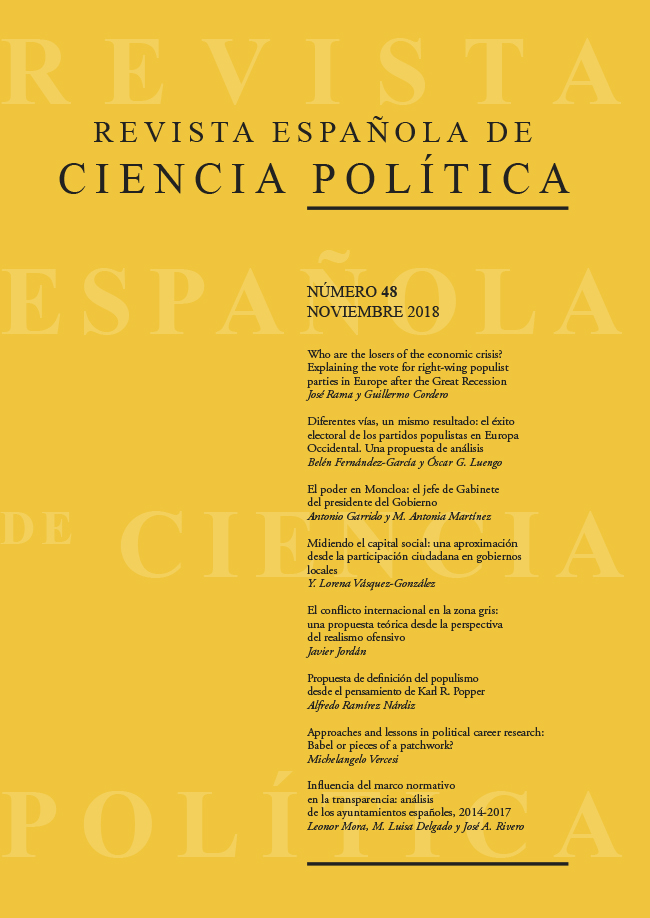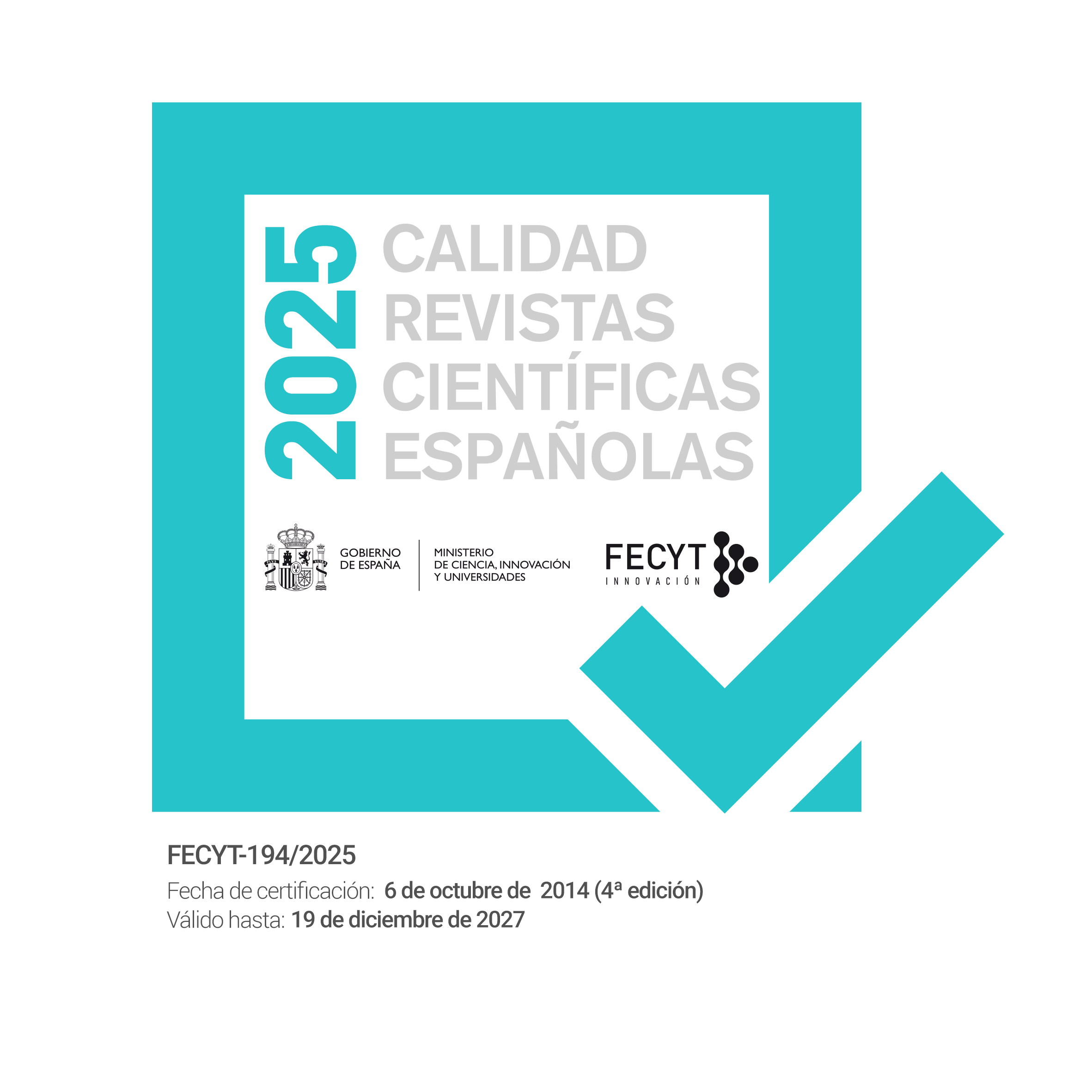Diferentes vías, un mismo resultado: el éxito electoral de los partidos populistas en Europa Occidental. Una propuesta de análisis
DOI:
https://doi.org/10.21308/recp.48.02Palabras clave:
populismo, anti-establishment, partidos políticos, rastreo sistemático comparado, QCA.Resumen
El objetivo de este artículo es analizar los escenarios electorales favorables para los partidos populistas en Europa Occidental tras la crisis económica. Para ello, se ha aplicado un rastreo sistemático comparado (comparative process tracing) a una selección de casos (España 2011-15, Reino Unido 2010-15 y Suecia 2010-14) como fase posterior a un análisis cualitativo comparado difuso (fsQCA) aplicado a veintiséis elecciones generales celebradas en Europa Occidental entre 2010 y 2015. Los resultados sugieren que el éxito electoral de estas formaciones no puede explicarse por una única condición causal, sino que diferentes vías pueden conducir al mismo fenómeno: por un lado, una demanda muy favorable al populismo (altos niveles de insatisfacción y desconfianza política) puede ser suficiente para explicar el éxito electoral de estos partidos, aun cuando compiten en contextos político-institucionales desfavorables; por otro, determinados patrones de competición partidista (coaliciones y convergencia en sistemas electorales proporcionales) pueden resultar suficientes, aun contando con una demanda poco favorable. Por último, esta propuesta de análisis puede extenderse al estudio de formaciones de otra índole como los llamados partidos antinmigración.
Descargas
Citas
Akkerman, Tjitske y Matthijs Rooduijn. 2015. «Pariahs or Partners? Inclusion and Exclusion of Radical Right Parties and the Effects on Their Policy Positions», Political Studies, 63 (5): 1140-1157. Disponible en: https://doi.org/10.1111/1467-9248.12146.
Bril-Mascarenhas, Tomás, Antoine Maillet y Pierre-Louis Mayaux. 2017. «Process tracing: inducción, deducción e inferencia causa», Revista Ciencia Política, 37 (3): 659-684. Disponible en: https://doi.org/10.4067/S0718-090X2017000300659.
Canovan, Margaret. 2002. «Taking Politics to the People: Populism as the Ideology of Democracy», en Yves Mény y Yves Surel (eds.), Democracies and the populist challenge. Nueva York: Palgrave. Disponible en: https://doi.org/10.1057/978140 3920072_2.
Delgado-Fernández, Santiago y Ángel Cazorla-Martín. 2017. «El Partido Socialista Obrero Español: de la hegemonía a la decadencia», Revista Española de Ciencia Política, 44: 247-273. Disponible en: https://doi.org/10.21308/recp.44.10.
Della Porta, Donatella, Joseba Fernández, Hara Kouki, Lorenzo Mosca. 2017. Movement Parties Against Austerity. Cambridge: Polity Press.
Duverger, Maurice. 2014. «Influencia de los sistemas electorales en la vida política», en A. Batlle i Rubio (eds.), Diez textos básicos de ciencia política. Barcelona: Ariel.
Fernández-García, Belén y Óscar G. Luengo. 2018. «Populist parties in Western Europe. An analysis of the three core elements of populism», Communication and Society, 31(3): 57-74.
Gallagher, Michael. 2015. Election indices dataset. Disponible en: https://bit.ly/2qkvtz5 [consulta: 28 de septiembre de 2017].
Goodwin, Matthew. 2015. «The Great Recession and the rise of populist Euroscepticism in the United Kingdom», en Hanspeter Kriesi y Takkis Pappas (eds.), European Populism in the Shadow of the Great Recession. Colchester: ECPR Press.
Hakhverdian, Armèn y Christel Koop. 2007. «Consensus democracy and support for populist parties in Western Europe», Acta Política, 42: 401-420. Disponible en: https://doi.org/10.1057/palgrave.ap.5500202.
Hanley, Sean y Allan Sikk. 2016. «Economy, corruption or floating voters? Explaining the breakthroughs of anti-establishment reform parties in Eastern Europe», Party Politics, 22 (4): 522-533. Disponible en: https://doi.org/10.1177/13540 68814550438.
Hooghe, Liesbet y Gary Marks. 2018. «Cleavage theory meets Europe’s crises: Lipset, Rokkan, and the transnational cleavage», Journal of European Public Policy, 25 (1): 109-135. Disponible en: https://doi.org/10.1080/13501763.2017.1310279.
Jungar, Ann-Cathrine. 2015. «Business as usual: Ideology and populist appeals of the Sweden Democrats», en Hanspeter Kriesi y Takkis Pappas (eds.), European Populism in the Shadow of the Great Recession. Colchester: ECPR Press.
Katz, Richard y Peter Mair. 2009. «The Cartel Party Thesis: A Restatement», Perspectives on Politics, 7 (4): 753-766.
Kitschelt, Herber y Anthony McGann. 1995. The radical right in Western Europe. Ann Arbor: University of Michigan Press.
Kriesi, Hanspeter, Edgar Grande, Romain Lachat, Martin Dolezal, Simon Bornschier y Timotheos Frey. 2006. «Globalization and the transformation of The National political space: six European countries compared», European Journal of Political Research, 45 (6): 921-56. Disponible en: https://doi.org/10.1111/j.1475-6765.2006.00644.x.
Kriesi, Hanspeter y Takis Pappas. 2015. European populism in the shadow of the great recession. Colchester: ECPR Press.
Luengo, G. Óscar y Belén Fernández-García. 2019. «Campaign coverage in Spain: Populism, emerging parties and personalisation», en Susana Delgado (eds.), Mediated Campaigns and Populism in Europe. Londres: Palgrave Macmillan.
March, Luke. 2017. «Left and right populism compared: The British case», The British Journal of Politics and International Relations, 19 (2): 282-303. Disponible en: https://doi.org/10.1177/1369148117701753.
Medina, Iván, Priscilla Álamos-Concha, Pablo José Castillo Ortiz y Benoit Rihoux. 2017. Análisis Cualitativo Comparado (QCA). Madrid: Centro de Investigaciones Sociológicas.
Mudde, Cas. 2004. «The Populist Zeitgeist», Government and Opposition, 39 (4): 542-563. Disponible en: https://doi.org/10.1111/j.1477-7053.2004.00135.x.
Mudde, Cas. 2007. Populist Radical Right Parties in Europe. Nueva York: Cambridge University Press. Disponible en: https://doi.org/10.1017/CBO9780511492037.
Mudde, Cas y Cristóbal Rovira. 2013. «Exclusionary vs. inclusionary populism: Comparing contemporary Europe and Latin America», Government and Opposition, 48 (2): 147-174. Disponible en: https://doi.org/10.1017/gov.2012.11.
Mudde, Cas y Cristóbal Rovira. 2017. Populism. A Very Short Introduction. Oxford; Nueva York: Oxford University Press.
Murphy, Justin y Daniel Devine. 2018. «Does Public Support for UKIP Drive Their Media Coverage or Does Media Coverage Drive Support for UKIP?», British Journal of Political Science (en prensa). Disponible en: https://doi.org/10.1017/S0007123418000145.
Norris, Pippa. 2005. Radical right: voters and parties in the electoral market. Cambridge: Cambridge University Press. Disponible en: https://doi.org/10.1017/CBO9780511615955.
Papadopoulos, Yannis. 2005. «Populism as the other side of consociational multi-level democracies», en Daniele Caramani y Yves Mény (eds.), Challenges to Consensual Politics: Democracy, Identity, and Populist Protest in the Alpine Region. Bruselas: P.I.E., Peter Lang.
Polk, Jonathan, Jan Rovny, Ryan Bakker, Erica Edwards, Liesbet Hooghe, Seth Jolly, Jelle Koedam, Filip Kostelka, Gary Marks, Gijs Schumacher, Marco Steenbergen, Milada Vachudova y Marko Zilovic. 2015. 2014 Chapel Hill Expert Survey. Version 2015.1. Chapel Hill, NC: University of North Carolina, Chapel Hill. Disponible en: www.chesdata.eu.
Riera, Pedro y José R. Montero. 2017. «Attemps to Reform the Electoral System in Spain: The Role of Experts», Election Law Journal: Rules, Politics, and Policy, 16 (3): 367-376. Disponible en: https://doi.org/10.1089/elj.2017.0439.
Rydgren, Jens 2008. «Sweden: The Scandinavian Exception», en Danielle Albertazzi y Duncan McDonnell (eds.), Twenty-First Century Populism: the Spectre of Western European Democracy. Basingstoke: Palgrave Macmillan. Disponible en: https://doi.org/10.1057/9780230592100_9.
Rydgren, Jens y Sara Van der Meiden. 2018. «The radical right and the end of Swedish exceptionalism», European Political Science, 1-17. Disponible en: https://doi.org/10.1057/s41304-018-0159-6.
Schedler, Andreas. 1996. «Anti-political-establishment parties», Party Politics, 2 (3): 291-312. Disponible en: https://doi.org/10.1177/1354068896002003001.
Schneider, Carsten e Ingo Rohlfing. 2013. «Combining QCA and Process Tracing in Set-Theoretic Multi-Method Research», Sociological Methods and Research, 42 (4): 559-597. Disponible en: https://doi.org/10.1177/0049124113481341.
Taggart, Paul. 2002. «Populism and the Pathology of Representative Politics», en Yves Mény y Yves Surel (eds.), Democracies and the populist challenge. Nueva York: Palgrave. Disponible en: https://doi.org/10.1057/9781403920072_4.
Van Kessel, Stijn. 2015. Populist Parties in Europe. Agents of Discontent? Londres: Palgrave. Disponible en: https://doi.org/10.1057/9781137414113.
Descargas
Archivos adicionales
Publicado
Cómo citar
Número
Sección
Licencia
Derechos de autor 2018 Belén Fernández-García, Óscar G. Luengo

Esta obra está bajo una licencia internacional Creative Commons Atribución-NoComercial-SinDerivadas 4.0.






